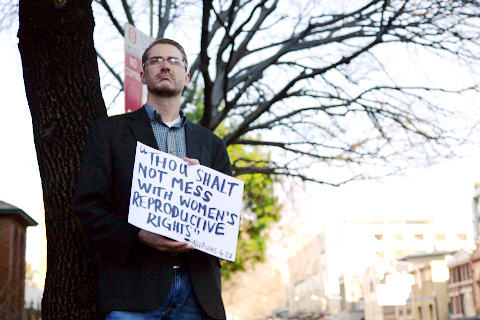Inside the city limits, it’s easier to forget that our reproductive rights are under attack. The old guys hoisting horror porn outside Planned Parenthood are the minority. The farther you drive outside Albuquerque—and into rural New Mexico—a proliferation of anti-abortion billboards emerge from the landscape. Our state’s history of allowing citizens, families and communities agency over their reproductive rights has afforded New Mexicans safety in complacency. But that era is over.In 1952 the Grand Old Party ceded control of the New Mexico House of Representatives. The Land of Enchantment’s traditionally Catholic culture was balanced by a Democratic House majority for 62 years. But the 2014 general election found the GOP back in the saddle, 37-33. And last week, six House Dems crossed the aisle to oppose nuevomexicano women’s right to control their own bodies.On Friday, March 6, the New Mexico House passed two bills on to the Senate that would establish 48-hour parental notification rules and a ban on “late-term” abortions (occurring at 20 weeks or beyond). Parental involvement laws, such as those included in HB 391, are dangerous because they prevent access to early abortions and, ironically, lead to complicated late-term abortions—medical procedures that carry a much higher risk of complications. And more than that, parental involvement laws are sinister because they’re part of a decade-long incremental strategy to chip away at the protections Roe v. Wade provides to American citizens.Under House Bill 390, the Late-term Abortion Ban, a physician who performs an abortion after 20 weeks of pregnancy can be fined $5,000 and have their medical license revoked for “no less than one year.” On their face, these bills are an attack on reproductive freedom. But hidden in both bills is something even more insidious. The late-term implications of the ban and the late-term consequences of the parental notification bill are laced with a conscience clause, also known as the “right of refusal.” This would allow pharmacists to refuse to dispense the morning-after pill and first-trimester abortion drug RU-486.Five Democrats—Patricio Ruiloba of Albuquerque, Jim Trujillo and Carl Trujillo of Santa Fe, Debbie Rodella of Española and Patty Lundstrom of Gallup—joined the GOP majority in passing HB 390, the late-term abortion ban, on to the state Senate. On the HB 391 vote, two Democrats, Albuquerque-based Ruiloba and Donna Irwin (D-Deming), joined the house majority in calling for a parental notification law.Both legal and social concepts of responsibility are often invoked in the abortion debate. A common pro-life and “family values” talking point is that engaging in sexual activity confers the responsibility of “accepting” potential consequences, including unwanted pregnancy. Because of this, providing medical care essential to the nature of human sexual reproduction is stigmatized and demonized. Meanwhile, the Guttmacher Institute reports that at current rates, one in three American women will have an abortion by age 45. Terminating a pregnancy is a common experience.During debate on HB 390, Eliseo Alcón (D-Milan) questioned Yvette Herrell (R-Alamogordo), the bill’s sponsor, about the number of late-term abortions being performed in New Mexico. Herrell replied that a lack of state records meant she didn’t know. The voluntary nature of reporting abortion statistics does make it difficult to get an accurate estimate of late-term abortions. But national statistics on late-term abortion indicate that merely 1.5 percent of abortions occur after 20 weeks of gestation. Translation: An infinitesimal fraction of all abortions are late-term abortions. For many women, the 18-to-20 week fetal abnormality scan is their first opportunity to learn about serious birth defects. Financial issues and transportation obstacles also factor into “late-term” decisions. The negligible percentage of abortions occurring after 20 weeks are so politicized that many physicians choose not to train for and perform late-term abortions. Doctors who do provide these necessary medical procedures are threatened—and sometimes even murdered—for practicing medicine. Reverence for these brave men and women is valuable, but understanding how pro-life forces’ incremental attack on reproductive rights informs a culture of violence is essential. In addition to restricting patient access, the passage of anti-abortion laws stokes the Biblical fires of the lunatic fringe. We must trust that women and their doctors are capable of making these decisions.The idea that an expensive, risky medical procedure is being undertaken lightly is an affront to the dignity of the women of New Mexico. Bills like HB 390 and HB 391 are part and parcel of a calculated strategy to undermine Roe v. Wade. In the abortion debate, junk science and emotional appeals are the heart of pro-life strategy. We can encourage a culture of life by respecting the autonomy of our fellow citizens. By passing laws that restrict reproductive freedom, we only promote extremist violence and partisan politics—not the health and welfare of New Mexicans.
Editor’s note: The print version of this editorial inflated the number of House Democrats voting for GOP-sponsored abortion bills from six to seven.






